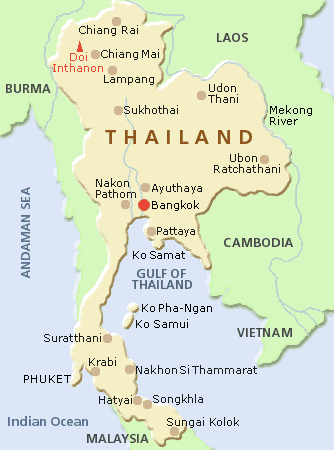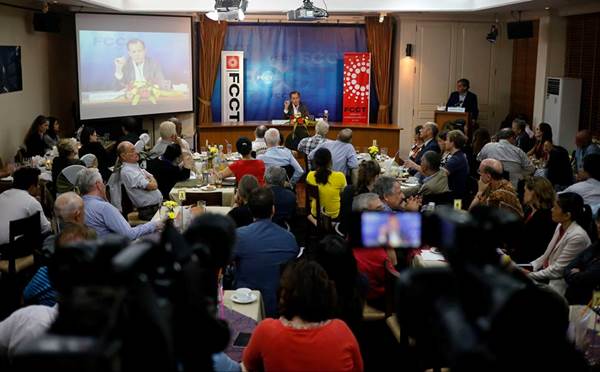Western Media Begins Information War on Thailand Ahead of Referendum Vote

Predictably, the tightly connected Western media, whose Southeast Asian correspondents often converge at the swank Foreign Correspondents’ Club of Thailand (FCCT) in downtown Bangkok to align and coordinate their often politically-motivated narratives, has begun an information war on Thailand ahead of Sunday’s referendum on the nation’s new charter.
This includes leveraging other Western-backed news organisations and political fronts in the region, including the recently installed client regime of Aung San Suu Kyi in neighbouring Myanmar.
Reuters in its report, “Myanmar paper: Thailand risks ‘substandard democracy’,” would report:
A state-run newspaper in Myanmar says Thailand risks “substandard” democracy if a military-backed draft constitution is approved in a referendum on Sunday.
The irony of the comment is hardly lost on voters and political observers alike across the region. For decades Myanmar suffered economic stagnation under harsh military rule while Thailand was seen as an Asian “tiger” economy with extensive freedoms and a developing democracy.
But the tables have turned recently, at least to some extent, with Myanmar democracy champion Aung San Suu Kyi winning a landmark election last year while Thailand has been ruled by a military government tough on dissent since a 2014 coup.
Image: Some might wonder what say a room full of white American and European men have in Thailand’s internal affairs, yet the disproportionate influence the FCCT wields in Thailand and across wider Southeast Asia is nonetheless very real.
What Reuters conveniently omits is the fact that Suu Kyi’s political front campaigned heavily before Myanmar’s elections to disenfranchise the votes of tens of thousands of Rohingya. This means Suu Kyi’s current regime is as much “substandard” in terms of democracy in reality as Myanmar’s Information Ministry-run newpaper has claimed of Thailand.
Australia’s ABC News would report in its February 2015 article, “Myanmar scraps temporary ID cards amid protests targeting ethnic minorities without citizenship,” that:
Myanmar’s government says identity cards for people without full citizenship, including Muslim Rohingya, will expire within weeks. The scrapping of ID cards snatches away voting rights handed to them just a day earlier (Tuesday), after Myanmar nationalists protested against the move.
The Rohingya, along with hundreds of thousands of people in mainly ethnic minority border areas, who hold the documents ostensibly as part of a process of applying for citizenship, will see their ID cards expire at the end of March, according to a statement from the office of president Thein Sein.
The dramatic about-face comes after protesters gathered in the commercial hub Yangon to call on the government not to allow people without full citizenship to vote in the proposed referendum.
The protests, it would be revealed, were led by Suu Kyi’s political supporters.
And since coming to power, Suu Kyi has systematically tightened pressure on the nation’s Rohingya population even further, often under-reported by news organisations like Reuters.
In fact, the same Information Ministry connected with recent anti-Thai comments, would be implicated in further targeting the Rohingya after Suu Kyi’s party took power. Australia’s ABC News in an article titled, “Burma leader Aung San Suu Kyi bans use of Rohingya name for oppressed Muslims,” would report:
In an Orwellian move, Burma’s Information Ministry has instead instructed officials to call Rohingyas “people who believe in Islam in Rakhine state”.
Ms Suu Kyi said: “All we are asking is that people should be aware of the difficulties that we are facing.”
It is not clear how eliminating a name reference will ease tensions or solve long-running differences.
But the decision has cast Ms Suu Kyi in the role of villain for the first time since she took effective control of the country in March.
It should also be noted, that Suu Kyi is not even the legal head of the Myanmar government, though she has vowed to “rule above” the government in what can be categorised as the absolute contravention of democracy.
Public Relations and Lobbying, or Journalism?
For Reuters and others engaged in the current media assault on Thailand, eager to undermine the legitimacy of Thailand’s current government and pave the way for yet another US-backed government to come to power in the region, Suu Kyi’s human rights abuses against the Rohingya constitute an inconvenient truth that would blunt the sort of public relations stunts Reuters is now engaged in with its so-called news coverage.
And while Reuters covers up the realities of Suu Kyi’s government in an attempt to portray it as an emerging democracy, it is also covering up the realities of Thailand’s current political crisis, consistently failing to inform readers of the violence, abuse of power and human rights abuses that were ongoing, including state-sponsored terrorism, just before the military took power in 2014.
Before the military seized power, the government they were to oust had deployed armed terrorists in the streets who attacked anti-government protesters almost nightly, killing and maiming many, including on the very eve of the 2014 coup.
Should Western news organisations like Reuters truthfully report on Thailand’s current political crisis, in context with the events that led up to it, the fact that the military by necessity took power would not seem all that unreasonable. Nor would the fact that the new charter seeks to prevent such political forces from taking power in the country again.
The Reuters article is just one of many penned recently echoing the same coordinated distortions, constituting what appears more like public relations campaigning and lobbying than objective journalism.
The New Atlas is a media platform providing geopolitical analysis and op-eds. Follow us on Facebook and Twitter.



